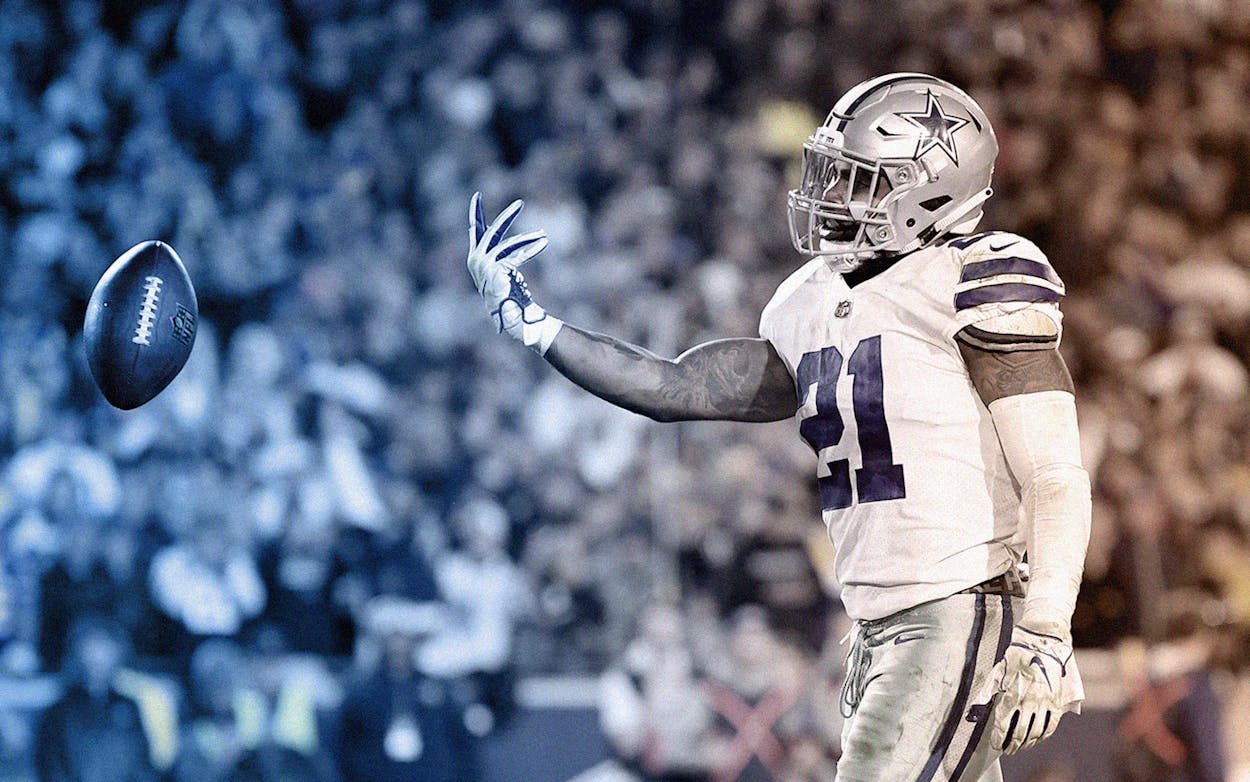Ezekiel Elliott might not play a single snap for the Dallas Cowboys this year. Until recently, that would have been an absurd thing to say about a healthy star with two years left on his contract. But that was before then-Pittsburgh running back Le’veon Bell held out the entire 2018 season in pursuit of a new deal. Bell won that battle of wills. The Steelers surrendered their claim on his services earlier this year, and he signed with the New York Jets.
Since then, the staring contest between NFL clubs and their best underpaid players, long tilted heavily in favor of ownership, has become more of an open question. Elliott, who is three years into his rookie contract, is reportedly threatening to follow Bell’s lead if Dallas refuses to grant a contract extension that pays him like the All-Pro talent that he is. (Elliott wouldn’t be eligible for free agency after the season, as Bell was, but he has his own leverage, which we’ll get to in a minute.)
Talk of NFL players being underpaid tends to rile up fans, who value their team’s wins and losses more than they worry about the financial future of young men paid millions to play a game. If Elliott should just be satisfied that he’s already richer than the vast majority of Americans will ever be, though, then Jerry Jones—whose net worth is hundreds of times greater than the running back’s—is among the most overpaid human beings in the history of the planet.
Given that the market determines the relative value of services in pretty much every industry, it’s fair to say that Elliott deserves to be paid what Bell, Rams star Todd Gurley, or other top players at his position are getting—somewhere in the neighborhood of $55 million over four years. For 2019, Elliott’s base salary is just under $3.9 million.
That number will go up in 2020—to almost $10 million for the fifth-season option on his rookie contract—after which the Cowboys can re-sign him, restrict him from entering free agency by applying the one-year franchise tag, or let him seek his fortune elsewhere. But Elliott’s rightly concerned that the Cowboys’ plans in 2019 are to ride him hard, putting his future career prospects—either with the Cowboys or with another team—at risk. Running backs with too many touches tend not to be attractive on their second contracts, and Elliott already hit the magic “400 touches” number that teams identify as a red flag for running backs last year. Elliott might get what he wants before the season starts—the Cowboys insist they have a strong offer on the table right now—but if he doesn’t, he’s right to hold out. His chances of getting the contract he’s seeking only decrease the more Dallas grinds him down with overuse on the field.
Meanwhile, the Cowboys face contract issues well beyond Elliott’s demands. The team signed pass rusher DeMarcus Lawrence to a five-year, $105 million deal this offseason. They’ve yet to extend the contracts of quarterback Dak Prescott, receiver Amari Cooper, or cornerback Byron Jones, and they’ll need to get those deals done before the start of the 2020 season. The salary cap makes paying Prescott, Cooper, Jones, and Elliott difficult. Prescott’s next deal could be in the $130 million range—similar to those signed by Russell Wilson and Carson Wentz—and Cooper’s is likely to top $100 million, as Saints receiver Michael Thomas’s new contract did. Jones is in line for about $80 million over four years, based on the contract signed by Dolphins corner Xavien Howard. Plus, three members of the offensive line will cost another $50 million in salaries for 2020, and the salary cap for that season will sit at about $200 million. While cap math can get complicated—deals can be structured to push a player’s hit against the cap to a future year—it’s possible that the Cowboys will be in a position where just eight or nine players will account for three-quarters of their cap space. In other words, it looks impossible for the team to pay every player it’s going to want to keep. Hard choices are coming.
Teams that are successful when their star players are on their first contracts have a much tougher time retaining high-level talent to surround them as those stars get more expensive to re-sign. Prescott accounts for a little more than $2 million toward the salary cap in 2019, which has given the team a lot of flexibility to bring in players like Cooper. By 2020, the quarterback will cost ten times that, and that flexibility goes out the window.
Which means that 2019 might be the last hurrah for this iteration of the Cowboys. Elliott’s obviously a big part of their hopes for the coming season—which is the very leverage that makes his potential holdout a smart strategy. The Cowboys salary cap situation will be a game of musical chairs in 2020. If Elliott can guarantee himself a seat for several seasons to come by threatening to disrupt the team’s plans, that could be his best shot to succeed at the business of football while playing the game’s most disposable position.
- More About:
- Sports
- NFL
- Football
- Jerry Jones
- Dak Prescott








